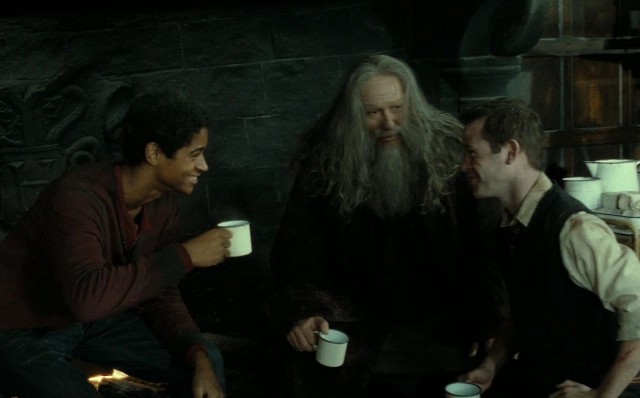How Wizards Do Money: Aberforth Dumbledore

The first thing everybody thought of was always that story about the goats. Aberforth and his goats. Why didn’t he call it the Goat’s Head, eh, or was that hitting a little too close to home? When people came to the Hog’s Head Inn they sometimes asked if they could see the goats, hitting “lovely goats” or “beautiful goats” a little too hard, just to make sure Aberforth was in on the joke.
Aberforth preferred it this way. Every question they asked about his goats was a question they weren’t asking about Ariana. Or about Gellert Grindelwald and Albus. Or about the secret passageway under the bar. Or about what happened to the money in the till, when the night was over.
Wasn’t any of their business what happened to the money anyway. Aberforth was the owner of the Hog’s Head Inn, it was his right to do what he liked with his earnings. He’d give the Ministry what he decided they were owed, and damn the rest. Why should they profit off his labor, when everybody who worked there was already better off than he was? What had the Ministry ever done for his family?
Aberforth knew that people saw him as the less-talented brother, the goat of the family compared to the white sheep Albus. Of course, he knew things about Albus that would turn that white wool black, things he had promised never to say aloud in exchange for — what? He was alive now and Albus was dead. That would have to serve as the exchange.
Percival Dumbledore had taught his children, right from the very beginning: what happens to you isn’t anybody’s business but your own. He also taught them that a truth was still a truth even if you left some parts out. Ariana was ill. That was the truth. Dangerously ill — that was the part that was left out. Then Albus wanted to take care of Ariana and told Aberforth to stay at Hogwarts. That was the truth. Why Albus wanted to return to the family home — well, that was the part that was always left out. Aberforth didn’t even know that part himself, until after the school year ended.
So Aberforth paid the taxes on his business and his land and left some parts out. It wouldn’t be right, after all, to pay taxes on the sale of stolen items. It also wasn’t right to pay a government that had imprisoned his father and almost imprisoned him — Albus had sorted that one out, which Aberforth knew was also part of the exchange — because paying your jailer for the privilege of being jailed was of course nonsensical. Any thinking man would see that point immediately, and Aberforth was a thinking man. He had a lot of time to think.
That bit about how he couldn’t read, though. That was clever of Albus. Forgave him a lot of sins, the one time he almost got caught. Such a sad man, running a business without knowing how to read or do sums properly. Such a sad old man with his tatty inn and his goats.
“I must have done the maths wrong.” That was the truth. But I did them wrong on purpose, you blibbering humdinger. That was the part that was left out.
And in the end, nobody ever asked Aberforth about how he managed his business. Nobody noticed what he was running behind the doors and under the tables. Everybody assumed that if Aberforth were doing something behind a closed door, it was with a goat.
And that was exactly how Aberforth wanted it.
Support The Billfold
The Billfold continues to exist thanks to support from our readers. Help us continue to do our work by making a monthly pledge on Patreon or a one-time-only contribution through PayPal.
Comments